|
|
|
Sort Order |
|
|
|
Items / Page
|
|
|
|
|
|
|
| Srl | Item |
| 1 |
ID:
181945


|
|
|
|
|
| Summary/Abstract |
Researchers have increasingly investigated emerging regional citizenships outside the European Union, including in Southeast Asia, South America and West Africa. Their accounts have, however, largely focused on efforts by regional organisations to promote a regional identity and enhance mobility. This article applies a broader comparative framework disaggregating regional citizenship into six constitutive elements. The approach enables a more comprehensive analysis of the nature and shape of emerging organisational citizenship regimes, the identification of potentially significant alternatives, and more systematic comparisons of both across global regions. It is applied first in identifying a duties-centric, top-down and developmental conception of citizenship implicit in recent communications to ‘ASEAN citizens’ by the Association of Southeast Asian Nations. That conception is compared to alternatives, including one implicit in Amitav Acharya’s model of participatory regionalism, and one drawn from field work among regionally networked, digitally focused social entrepreneurs within ASEAN states. The latter indicate a conception which is duties centric but also foregrounds entrepreneurs’ potential for agency and leadership in regional development. We close with a discussion of different practical challenges, related to different elements of citizenship, each conception faces, and the potential for alternatives such as entrepreneurial regional citizenship to influence emergent organisational regimes.
|
|
|
|
|
|
|
|
|
|
|
|
|
|
|
|
| 2 |
ID:
167023
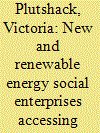

|
|
|
|
|
| Summary/Abstract |
In a world that increasingly invites private actors to address social needs, there has been a rise of social enterprises in a variety of sectors, including new and renewable energy. As of yet, little research has focused on how these enterprises interact with government policy in low- and middle-income countries. This research specifically explores how social enterprises operating in rural India with decentralised renewable energy solutions seek to access government support, and what strategies they adopt to engage with the government. An inductive theory-building approach was adopted to explore this and advance current knowledge in the boundaries of social entrepreneurship and policy. We propose ‘Engagement’ and ‘Disengagement’ as the two strategies used by social enterprises in this context in accessing government support and policy. ‘Engagement’ is a strategy comprising of the tactics: (a) Leveraging Policy, (b) Building and Leveraging Relationships, (c) Lobbying, and (d) Monitoring. ‘Disengagement’ is a strategy comprising of the tactics: (a) Avoiding Government Presence, and (b) Disengagement from Policy.
|
|
|
|
|
|
|
|
|
|
|
|
|
|
|
|
| 3 |
ID:
127780
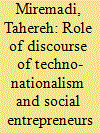

|
|
|
|
|
| Publication |
2014.
|
| Summary/Abstract |
This paper discusses the role of social entrepreneurship and the discourse of techno-nationalism in defining national selfhood in contemporary Iran. To examine the issue, this paper develops an in-depth case study of the development of stem cell research, and shows how an alliance between the leaders of the scientific community and Iran's politico-religious authority contributed to building technological capacity in the field of stem cell research in the first decade of the twenty-first century. The paper also highlights how the preliminary success of stem cell research, along with other knowledge-intensive technologies, has created a shared feeling of national pride and has served as the material base for the contemporary discourse of techno-nationalism. The paper concludes with the notion that the techno-nationalist discourse has the inherent potential to unwittingly help to redefine the dichotomy between Iran and the West in such a way that it becomes less antagonistic, should other factors permit.
|
|
|
|
|
|
|
|
|
|
|
|
|
|
|
|
| 4 |
ID:
143316
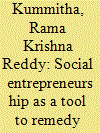

|
|
|
|
|
| Summary/Abstract |
Inspired by the practice of social enterprises, this article aims to understand how work integration social enterprises (WISE) function in relation to labour market integration of socially excluded persons in India. While mainly examining how socially excluded persons benefit from such interventions, questions are asked about what motivates social enterprises to get involved and to what extent they benefit themselves. Built on case study research in India, this article identifies a potential win–win situation, as members of excluded communities are empowered through the work integration approach, but social enterprises also benefit by building trust and achieving a sustainable orientation.
|
|
|
|
|
|
|
|
|
|
|
|
|
|
|
|
| 5 |
ID:
147844
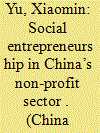

|
|
|
|
|
| Summary/Abstract |
In recent years, civil society organisations in China have increasingly taken entrepreneurial and innovative approaches to enhance their ability to fulfil social missions. How are we to delineate the salient characteristics of non-profits engaging in socially entrepreneurial activities in comparison with their conventional counterparts? Will the emergence of social entrepreneurship in China’s non-profit sector engender new opportunities for grassroots social organisations to overcome the financial and institutional impediments constraining their development? This article tackles these issues through an in-depth case study of a typical social entrepreneurship initiative launched in the process of post-disaster construction after the 5.12 Wenchuan Earthquake in 2008. The findings indicate that socially entrepreneurial non-profits participate in post-disaster reconstruction more innovatively than conventional non-profits in various ways. Nevertheless, they still need to conquer organisational and contextual challenges before evolving into an effective remedy to the development pains of grassroots social organisations in China.
|
|
|
|
|
|
|
|
|
|
|
|
|
|
|
|
| 6 |
ID:
097166
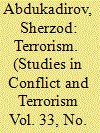

|
|
|
|
|
| Publication |
2010.
|
| Summary/Abstract |
The view of terrorists as entrepreneurs is not new. Yet, unlike traditional entrepreneurs, they are not motivated by profits. This article argues that terrorists are social entrepreneurs. They are motivated primarily by social returns. Furthermore, their main output is a public good due to its non-rival and non-excludable properties. Using social entrepreneurship theories, this article presents an alternative view of the incentives behind the formation of terrorist organizations. It concludes with a discussion of policy implications of this framework for combating terrorism.
|
|
|
|
|
|
|
|
|
|
|
|
|
|
|
|
|
|
|
|
|